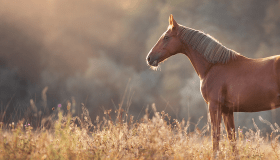
January 13, 2021 – For more than 70 years, Morris Animal Foundation has been a global leader in funding studies to advance animal health. With the help of generous donors like you, we are improving the health and well-being of dogs, cats, horses and wildlife around the world.
Chronic Postoperative Pain
Spinal cord injuries are synonymous with back pain. North Carolina State University researchers, who study dogs with acute spinal cord injuries, found pain thresholds normalized for most dogs following back surgery at around six months. However, even though they seem normal after assessment by veterinarians and owners, about 15% of dogs may still experience chronic pain and need longer-term pain medication and management. (Journal of Veterinary Internal Medicine, May 2020)
Eye Infections
Cats with upper respiratory infections (URIs) often suffer from eye-related infections that can lead to blindness. University of California, Davis, researchers studied the bacterial microbiota (bacterial communities) in the eyes of shelter cats with URIs to learn if these communities changed, and whether the change could be exploited to avoid serious eye problems in URI cats. Although the team found the bacterial microbiota changed significantly in these cats one week following shelter entry, giving an antiviral medication didn’t halt this switch. Future research will look at other medications to potentially minimize eye infections in these patients. (Journal of Feline Medicine and Surgery, August 2020)
Alpaca Genome
The alpaca genome doesn’t just help alpacas, but is a valuable research tool to study diseases in related species, including llamas and camels. Texas A&M University researchers are continuously working to improve the current assembly and annotation of the alpaca genome and recently reported mapping 35 new markers. Their cumulative findings are helping the research community discover genetic mutations and develop screening tests to minimize incidence of disease and other health issues in alpacas and their genetic cousins. (Genes, May 2020)
Emerging Salamander Disease
During the COVID-19 crisis, pooled testing (testing the DNA in the environment) is becoming an increasingly common way to track community infection spikes. Pooled testing also is being used to track Batrachochytrium salamandrivorans (Bsal), a deadly, emerging salamander disease. Washington State University researchers developed a way to screen for Bsal in entire populations of salamanders and other aquatic amphibians. This method will help reduce labor-intensive swabbing and testing of individual animals, minimizing the risk of Bsal spread to vulnerable animals. (Scientific Reports, June 2020)




